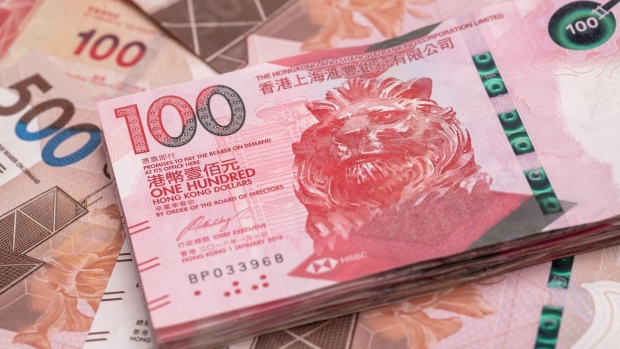Feb 13, 2023
Hong Kong Dollar Hits Weak End of Band, HKMA Intervenes For First Time Since November
, Bloomberg News

(Bloomberg) -- Hong Kong’s de facto central bank bought local dollars to defend its peg to the greenback for the first time since November, as a slump in bank borrowing costs made shorting the city’s currency a popular trade.
The Hong Kong Monetary Authority purchased HK$4.2 billion ($538 million) worth of local dollars. The operation will reduce the city’s aggregate balance, a gauge of interbank liquidity, to HK$91.86 billion on February 15. This move could potentially drive up local funding costs and squeezing the bearish trades.
A slump in the city’s interbank rates — to their deepest ever discount to US counterparts — prompted hedge funds to borrow the currency cheaply and sell it against the higher-yielding US dollar. The one-month Hibor fell to a five-month low of 2.12% Tuesday. Comparable rate on the greenback, or Libor, stood at 4.58% as of Friday, resulting in the widest spread on record.
HK Dollar Carry Trade Flares on Widest Yield Gap Since 2007
The HKMA frequently intervened to boost the local dollar from May to November, reducing the city’s aggregate balance to the lowest since 2020. While such a move would eventually support the currency, it can also act as a headwind for the local economy. Hong Kong’s growth contracted last year for the third time since 2019.
“The Hong Kong dollar weakening is likely to be short-lived,” said Samuel Tse, economist at DBS Bank in Hong Kong. “When the demand for Hong Kong dollar assets returns amid China’s reopening, the local currency will strengthen again,” he said, forecasting it to trade at 7.78 by quarter-end.
Bill Ackman, the billionaire founder of hedge fund Pershing Square Capital Management LP, said in November he was betting against Hong Kong’s currency and its peg citing the city’s weak economy. Kyle Bass, the founder of Hayman Capital Management and George Soros have also wagered on a collapse of Hong Kong’s currency peg in the past.
What the Hong Kong Dollar Peg Is and Why It Matters: QuickTake
(Adds latest aggregate balance, updates Hibor-Libor gap)
©2023 Bloomberg L.P.





